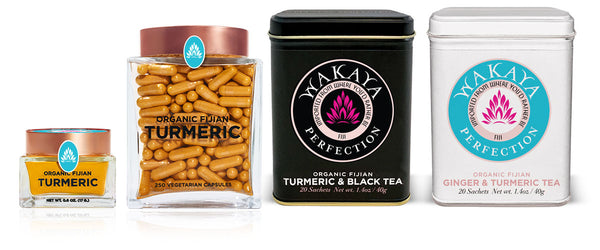Turmeric and Ginger - The Super Duo
Ginger
Ginger is one of the most studied plants by the medical community. The ginger root has bioactive compounds called Gingerols. Studies show that ginger may help with:
- Nausea
- Inflammation
- Digestion
- Pain and discomfort
Turmeric
Turmeric contains bioactive compounds called curcuminoids. You may see the words turmeric and curcumin used interchangeably. Turmeric has very potent medicinal properties and can help with:
- Chronic inflammation
- Powerful antioxidant
- Improved brain function
- It may help stop the growth of cancer cells.
Ginger and Turmeric Together
Since both of these spices have powerful healing properties, the two complement each other by working together in the body.
Anti-inflammatory: Both ginger and turmeric help with inflammation by relaxing muscles and reducing joint pain in people with arthritis. Turmeric can also help with chronic inflammation, which helps lower the risk of heart disease.
Digestion: Ginger can help with digestion by helping the stomach digest food faster. It can also help with nausea. Ginger also helps prevent the growth of H Pylori, the leading cause of ulcers in the stomach. Turmeric, on the other hand, works in the intestinal tract helping to relieve flatulence. Together both can help alleviate common digestive ailments.
Immune System: In test-tube studies, ginger extract blocked several different strains of respiratory pathogens. Another study with mice found that ginger helped with seasonal allergies.Several studies with curcumin have shown that it has anti-viral properties and effectively reduces the severity of the influenza A virus.
Ginger and turmeric complement each other because they both have different bioactive properties. Ancient cultures used these rhizomes for centuries, and they hold up even in the modern world. Separately they each have potent healing properties, but together they can tackle a broad spectrum of ailments.
Experience our full collection of organic Fijian turmeric products today!
SHOP THE COLLECTION
Referenced Studies
Ginger and Respiratory
https://pubmed.ncbi.nlm.nih.gov/23123794/
https://pubmed.ncbi.nlm.nih.gov/26403321/
Curcumin and Influenza
https://pubmed.ncbi.nlm.nih.gov/29153953/

